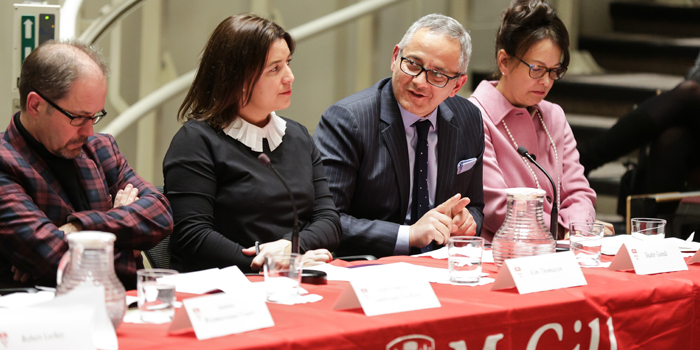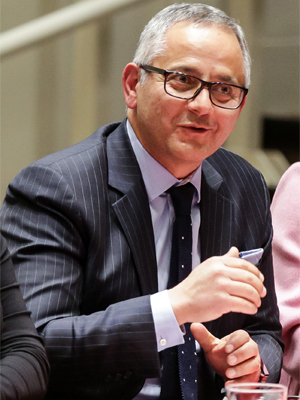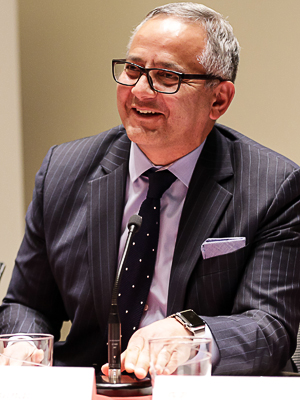
When the Faculty hosted a panel on the future of legal education, Shahir Guindi, BCL’89, LLB’89, was one of five eminent jurists invited to share their insight on the changing legal market. National co-chair of Osler, Hoskin & Harcourt LLP, he has repeatedly earned recognition as one of the country’s top corporate lawyers. A member of the board of several companies, he is also a sought-after business strategy expert. Focus met with him to discuss his professional journey, and what he considers the key to a successful legal career.
Why did you decide to study law?
I never decided to study law. Because I loved math, I was studying business, accounting more particularly. But it didn’t exactly give me the depth of math I was looking for, so I got bored. I had no clue what I wanted to do so, on a whim, I decided to send applications to three different programs in three different universities, and that I would go to whichever one came first. I applied to Western University in Actuarial Math, Waterloo in Computer Science, and McGill Law. When the McGill Law acceptance came back before the others, I said “I guess it’s meant to be!” and that’s where I went.
Your parents must have been surprised.
Yes! They weren’t boasting to all their siblings back in Egypt, where I was born, because over there, law was the faculty of last resort, where you went to if you couldn’t get accepted in anything else! (Laughs) But they understood that it was a great thing to do here.
Was it clear from the start that you wanted to practice corporate law?
When I graduated and started my articles, in 1990, the business market was quite quiet. And unfortunately for those who wanted to do business law, most of us ended up doing litigation at the time, where firms needed more support. When the economy started to pick up, then there was more opportunity to do corporate and transactional work. I find it much more fulfilling to get in a room, and negotiate a win-win solution with you in terms of “How am I going to sell you a company,” “How are we going to finance you”; and “How are you going to grow?” In litigation, both clients leave upset, because they had to pay money to get to defend their rights, whereas in a corporate transaction, both clients leave happy. I am exactly in the field of law that I should be.
You started with Osler when they were barely starting to establish themselves in Québec. Can you tell us about your experience?
I joined Osler in 2001. I think I was the first corporate lawyer they hired in the province aside from the founder of the office. When I went to visit the offices, they were not worthy of an eighth-tier law firm in Montreal. It was for sure the hardest of the various options I had. It was a kind of practice I didn’t know, and we were starting on the ground floor: no real premises, no real infrastructure, and no clients. But it had two things I really appreciated. One, in speaking with the partners that were in Toronto, I fell in love with the culture of the firm, and their “all for one, one for all” philosophy of success. Leaving aside that I know Olser was doing the best matters in the country, the most high profile, the most difficult, the most complex, the highest dollar amounts. Second, it was an opportunity to exercise my entrepreneurial bent. I wanted to participate in building something. We had our missteps, we had our miscalculations, but we had our successes, and looking back today, they outweigh the challenges we’ve had by far.
What skills do young lawyers need to succeed in today’s challenging legal market?
I am not going to spend a lot of time talking about dedication, hard work, and persistence. I will, however, talk about the ability to inspire the confidence of your clients and your confrères and consoeurs, even when they are on the other side of a matter. That comes with communication skills, and the right listening skills. Creativity is a very important skill. We mistake so many issues for zero sum issues when there can be a win-win solution. But sometimes, you have to bring in elements that are outside of the sandbox, outside of the dialogue we’re having now. Also, seeing the big picture. Sometimes young lawyers are focused on too narrow a point. It’s not about thinking whether the thing in front of me is right or wrong, but thinking about what’s not on the page and should be on the page.
This draws back to the anecdote I shared during the panel: a young lady in her first year of undergrad who wanted to study law asked me if she should get an internship at a law firm over the summer. Why? Go do something else, I told her. Learn to play the piano, climb Kilimanjaro, do humanitarian work. Go learn things the firm can’t teach you, things that will distinguish yourself from other lawyers in the country, so that when you sit at a table with your client, they’ll think “She’s special. She’s the one with the creative solutions, she’s the one who sees the objective, she’s the one who inspires confidence.” No one is going to say “She’s the one who knows the law better than others.” Anyone who practices at this level knows the law. That’s not a distinguishing factor.
You mentioned that business skills should be offered as part of a lawyer’s training. What can faculties do to better prepare their students?
When I was in university, I noticed that dentistry faculties offered courses about the business of dentistry, the law of dentistry, the regulatory framework of dentistry… Why wouldn’t the law faculty offer a course on accounting? Whether you are a litigator, a human rights lawyer, or a government attorney, you need to understand what a balance sheet is. Also, if you are going to private practice, or even in-house, you need to understand how the business works. I know that we speak of law as a noble profession, and it remains an extremely noble profession. But the market has evolved as such that if anyone thinks that a law firm doesn’t also operate as a business, they are wrong. A lot of lawyers become sole practitioners, and no one has taught them how to practice law; not from the legal side of it, but from the business side of it.
Diversity in big firms was one of the topics of discussion during yesterday’s panel, and one law firms continue to struggle with. What are your views on the matter?
 We always tell the students we hire that the most important thing is that you enjoy the people who work with you. For that to happen, there has to be some sort of chemistry, which means that we are always more likely to hire someone that is more like us. A concerted effort has to be made to embrace people who are extremely talented, but who are not necessarily like us. I am not talking about compromising talent in any way. Law firms have to resist subconscious bias in their recruiting.
We always tell the students we hire that the most important thing is that you enjoy the people who work with you. For that to happen, there has to be some sort of chemistry, which means that we are always more likely to hire someone that is more like us. A concerted effort has to be made to embrace people who are extremely talented, but who are not necessarily like us. I am not talking about compromising talent in any way. Law firms have to resist subconscious bias in their recruiting.
To that point, I always give credit to my first law firm, Davies. At the time, the firm’s name was Phillips and Vineberg, and it had the reputation of being “a more Jewish law firm.” And this is in 1985–1986, at a time when there was a lot of discord in the Middle East. People at the Faculty were saying: “You’re the Egyptian boy from the West Island, there’s no chance in hell they’re going to make you an offer there!”, but to their credit, they did make me an offer. Not only that, they gave me a lot of opportunities, and allowed me to become a partner. I was always very grateful, because that’s the opportunity I needed. If they had been looking for people who were just like them, I wouldn’t be where I am today. Osler offered me that opportunity too. Once again, I was completely off the beaten path from people they hired. But sometimes, there are great people who just need an opportunity.
What advice would you give your younger self?
I would tell younger me “Don’t worry, if you keep at it, and stay true to your value system, and you work hard, and you continue to treat people the way you want them to treat you, you are honest, and fair, and generous, things will work out for you. Just keep going.” Sometimes, as you go through that journey, you might feel that some of these characteristics that matter to you won’t get you through to the other side. But they will.
Interview: Karell Michaud. Photos: Sylvain Légaré

